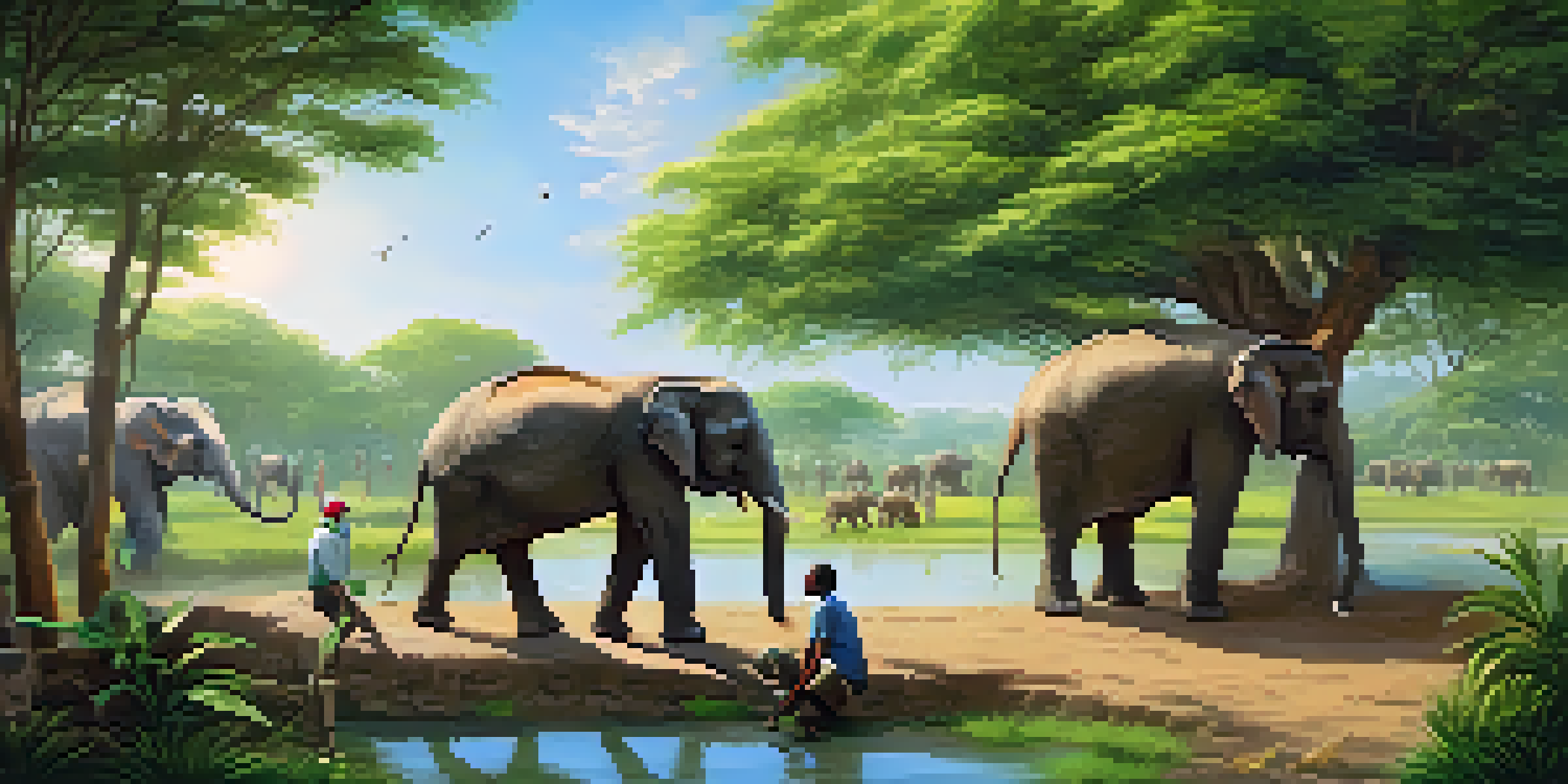Top Organizations for Wildlife Rehabilitation in India

Wildlife Trust of India: Pioneers in Conservation Efforts
The Wildlife Trust of India (WTI) stands out as a significant player in wildlife rehabilitation. Established in 1998, WTI focuses on protecting endangered species and their habitats through various conservation initiatives. Their approach combines scientific research with community engagement, making a lasting impact on both wildlife and human populations.
The greatness of a nation and its moral progress can be judged by the way its animals are treated.
One of WTI's notable projects is the rehabilitation of injured and orphaned wildlife, which includes a dedicated team of veterinarians and wildlife experts. They operate rescue centers across India, providing medical care and rehabilitation to animals like elephants, leopards, and birds of prey. Through their efforts, countless animals have been successfully returned to their natural habitats.
In addition to direct rehabilitation, WTI is actively involved in advocacy and education, raising awareness about the importance of wildlife preservation. Their outreach programs emphasize the role of local communities in protecting wildlife, creating a well-rounded approach to conservation.
The Bombay Natural History Society: A Legacy of Wildlife Care
The Bombay Natural History Society (BNHS), founded in 1883, is one of the oldest organizations dedicated to wildlife conservation in India. With a rich history of research and advocacy, BNHS has also expanded its efforts to include wildlife rehabilitation. Their focus is on preserving biodiversity and ensuring the survival of various species through comprehensive rescue operations.

BNHS operates several rescue centers, particularly for birds and small mammals, where they provide medical care and rehabilitation services. Their team of wildlife specialists works tirelessly to treat injured animals, ensuring they receive the best possible care before being released back into the wild. This commitment has made them a trusted name in wildlife rehabilitation.
Conservation through Community Engagement
Organizations like WTI and Wildlife SOS emphasize involving local communities in wildlife preservation efforts to create a sustainable impact.
Furthermore, BNHS conducts training programs for veterinarians and wildlife enthusiasts, sharing knowledge on best practices in rehabilitation. This educational component not only enhances their rehabilitation efforts but also empowers others in the field, fostering a culture of conservation across India.
Wildlife SOS: Compassion and Care for Wildlife
Wildlife SOS is another prominent organization committed to the welfare of wildlife in India. Founded in 1995, their mission is to rescue and rehabilitate animals in distress, particularly those affected by human-wildlife conflict. Their approach is rooted in compassion, prioritizing the well-being of the animals they serve.
An animal's eyes have the power to speak a great language.
Wildlife SOS operates several rescue facilities, including an elephant sanctuary and a bear rescue center. These sanctuaries provide a safe haven for animals rescued from captivity or abusive situations, allowing them to live in a natural environment. Their dedicated team focuses on rehabilitation and the psychological well-being of the animals, ensuring they can thrive.
In addition to rehabilitation, Wildlife SOS engages in conservation education, working with local communities to promote coexistence with wildlife. Their programs aim to reduce conflict and foster understanding, creating a more harmonious relationship between humans and animals.
The Nature Conservancy: Global Impact, Local Efforts
The Nature Conservancy (TNC) is a globally recognized organization that works towards conservation and restoration of natural habitats. In India, TNC has been instrumental in wildlife rehabilitation, focusing on both land and marine ecosystems. Their efforts emphasize sustainable practices that benefit both wildlife and communities.
TNC collaborates with local organizations to develop rehabilitation programs tailored to specific species and habitats. One notable initiative involves the conservation of marine turtles, where they work to rescue injured turtles and rehabilitate them for release. This hands-on approach ensures that the animals receive the care they need to survive in the wild.
Diverse Approaches to Rehabilitation
Various organizations in India, such as BNHS and IWRC, employ tailored rehabilitation programs for different species, ensuring specialized care and successful recovery.
Moreover, TNC engages in policy advocacy, pushing for stronger environmental protections that support wildlife rehabilitation efforts. Their holistic approach combines on-the-ground action with strategic policy initiatives, making them a key player in the conservation landscape.
Bird Conservation Network: Focusing on Avian Welfare
The Bird Conservation Network (BCN) is dedicated to the protection and rehabilitation of birds across India. Formed by a group of passionate birdwatchers and conservationists, BCN focuses on rescuing injured or orphaned birds and providing rehabilitation services. Their commitment to avian welfare has made them a respected name in the field.
BCN operates several rescue centers where trained volunteers and veterinarians work together to treat birds in need. Their facilities are equipped to handle a variety of species, from raptors to songbirds, ensuring each bird receives specialized care. The organization's efforts have resulted in the successful rehabilitation and release of thousands of birds back into their natural habitats.
In addition to rehabilitation, BCN conducts educational workshops and community outreach programs to raise awareness about bird conservation. They emphasize the importance of protecting avian species and their habitats, fostering a sense of responsibility among local communities.
Indian Wildlife Rehabilitation Centre: A Safe Haven
The Indian Wildlife Rehabilitation Centre (IWRC) serves as a sanctuary for injured and orphaned wildlife. Established with the goal of providing specialized care, IWRC focuses on a wide range of species, including mammals, birds, and reptiles. Their experienced team is dedicated to ensuring that each animal receives the treatment necessary for recovery.
IWRC is known for its state-of-the-art facilities and holistic rehabilitation programs. They emphasize not only physical recovery but also behavioral rehabilitation, preparing animals for a successful return to the wild. This comprehensive approach has resulted in a high success rate for released animals, showcasing their commitment to wildlife welfare.
Collaboration Enhances Wildlife Care
The success of wildlife rehabilitation in India relies on collaboration among organizations, government, and communities to share resources and best practices.
Additionally, IWRC is involved in research and training initiatives aimed at improving wildlife rehabilitation practices across the country. By sharing their knowledge and experiences, they contribute to the broader field of conservation, inspiring others to prioritize wildlife care.
The Elephant Conservation and Care Centre: Protecting Giants
The Elephant Conservation and Care Centre (ECCC) is dedicated to the rescue and rehabilitation of elephants in India. Recognizing the unique challenges faced by these majestic creatures, ECCC provides a sanctuary for elephants rescued from captivity or abusive situations. Their focus is on creating a nurturing environment that promotes healing and recovery.
At ECCC, elephants receive comprehensive veterinary care, nutrition, and enrichment activities. The team works tirelessly to address their physical and emotional needs, helping them adjust to life in the sanctuary. This dedication to elephant welfare has made ECCC a beacon of hope for many elephants in distress.

ECCC also engages in educational outreach, raising awareness about the plight of elephants and the importance of conservation. By fostering a sense of connection between people and elephants, they inspire a collective effort to protect these gentle giants and their habitats.
Wildlife Rehabilitation: A Collaborative Effort
Wildlife rehabilitation in India is not just the work of individual organizations; it relies on collaboration among various stakeholders. From government agencies to local communities, everyone plays a role in supporting wildlife conservation efforts. This collective approach enhances the effectiveness of rehabilitation programs and creates a network of support for wildlife.
Many organizations work together to share resources, knowledge, and best practices in rehabilitation. Joint initiatives often lead to better outcomes for animals in need, as different groups bring unique expertise to the table. For example, veterinary care, habitat restoration, and community engagement are all crucial components that benefit from collaboration.
The synergy created through these partnerships ultimately leads to a more sustainable approach to wildlife rehabilitation. By pooling resources and expertise, organizations can tackle larger challenges, ensuring a brighter future for wildlife in India.